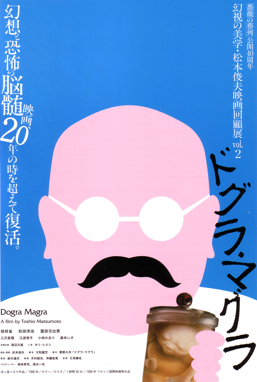
If someone like me, a fairly seasoned veteran of moviegoing and -reviewing, can’t make head or tail of Dogura Magura, what does that bode for everyone else? I ask this question not because I’m hostile to difficult movies; in fact, I actively seek them out. But Dogura Magura has a narrator that can’t be trusted telling a story that may have no substance in a plot that may never have existed to begin with. It’s a pretentious version of one of those thrillers where every piece of evidence can be read one of two ways, and the identity of the killer can be changed in the very last shot to appease the test marketers.
The movie is an adaptation of a widely-revered surrealist novel from 1935 Japan, repeatedly described as unfilmable, so maybe you need to be a fan of the book to feel any connection with the material. From what I understand, the movie actually follows the book fairly closely, but a movie version of any story needs to stand on its own and not require support from the readers. The director was Toshio Matsumoto, the avant-garde filmmaker who gave us Funeral Procession of Roses, so he was no stranger to outlandish material or non-linear storytelling. I’m not sure it helped.
Dogura Magura (the title means something like “Abracadabra”) opens with a young man (Yôji Matsuda) waking up in an insane asylum. He remembers nothing, not even his name, so when the tall and grave Dr. Wakabayashi (Hideo Murota) enters his cell and hints that he may be a killer, he’s in a near-frenzy of confusion. The good doctor informs the young man that another doctor at the institute, the Tojo-esque Dr. Masaki (Shijaku Katsura) was leading a project to recover the boy’s memory, but died about a month ago and has left everything unfinished. Wakabayashi has now decided to finish the other man’s work, and so shows the boy several artifacts in an attempt to trigger his memory.
He also shows the boy a good deal of Masaki’s own work (visualized as though Masaki himself were lecturing), which is heady stuff indeed. Masaki believed that the brain is not in fact responsible for thought and cognition, but rather that memories are stored in all the cells of the body, and that the brain is simply responsible for coordinating connections between the different cells. Mental illness is, in fact, genetic illness. His proof of this comes in the form of a story about a Chinese prince who became fascinated with making paintings of a woman’s corpse as it progressively decayed. Since they believe the boy is a direct descendant of this man, then maybe he has the same tendencies?
If all of this seems murky, bear in mind this is covered by less than a third of the film’s running time. The vast majority of the film consists of one of the two doctors lecturing the boy, or the boy lecturing himself, or some other bizarre variant of the above. Just when we think we have a handle on what’s going on, the movie injects some left-hand twist that allegedly rewrites everything we saw before—but since the whole thing is from the point of view of the boy anyway, how can any of it be trusted? Is he even really insane? Is any of this actually happening? Who cares?
I have to point out that I have not read the original novel (it’s never been translated into English), so I can’t say whether or not the book is better; this may have been a case where the book simply wasn’t all that great to begin with. But in a book, you can play games with the reader a little more effectively than you can with a movie, partly because movies are far more literal creatures. Sometimes a director can break radically from his material and still make something interesting (as they did with The French Lieutenant’s Woman), but maybe here there was no way to diverge from the book without having it completely fall to pieces.
This is a very weird, very nice movie, like the review says it's difficult to follow, but it's really a nice movie, it's hardsubbed in english.Movies like this generally only have two things going for them: technical craft and cleverness. There’s no question that the movie is immensely well-made; Matsumoto’s camerawork is excellent and there are a great many creative visualizations of things. At one point during an explanation of the Chinese’s prince’s behavior, the movie switches to a bunraku-style puppet play, which actually seems to work to distinguish that part of the movie from everything else. And people who thought The Usual Suspects was a head-twister will faint when they see how knotty this movie gets.
But that’s about it. There’s no one to empathize with; the characters are all either insane or monstrously inhuman. The story’s essentially arbitrary, and since the movie holds all the cards anyway, there’s no point in trying to figure it out. On some abstract level, it’s neat, but there are no real surprises, and when it’s over, nothing’s changed. It’s like watching someone play chess against himself, swatting your hands away from the board every time you try to join him. What fun is that?
http://www.thegline.com/dvd-of-the-week ... 2-2004.htm
CD 1:
Video: XviD @ 1582 Kb/s
Audio: Mp3 @ 128kb/s
Lenght: 00:57:08
Resolution: 640x368 (1.74:1) [=40:23]

CD 2:
Video: XviD @ 1743 kb/s
Audio: Mp3 @ 128kb/s
Lenght: 00:52:13
Resolution: 640x368 (1.74:1) [=40:23]

Otras copias
- DVDRip VOSE (700 MB; limpia de subtítulos incrustados en inglés)











